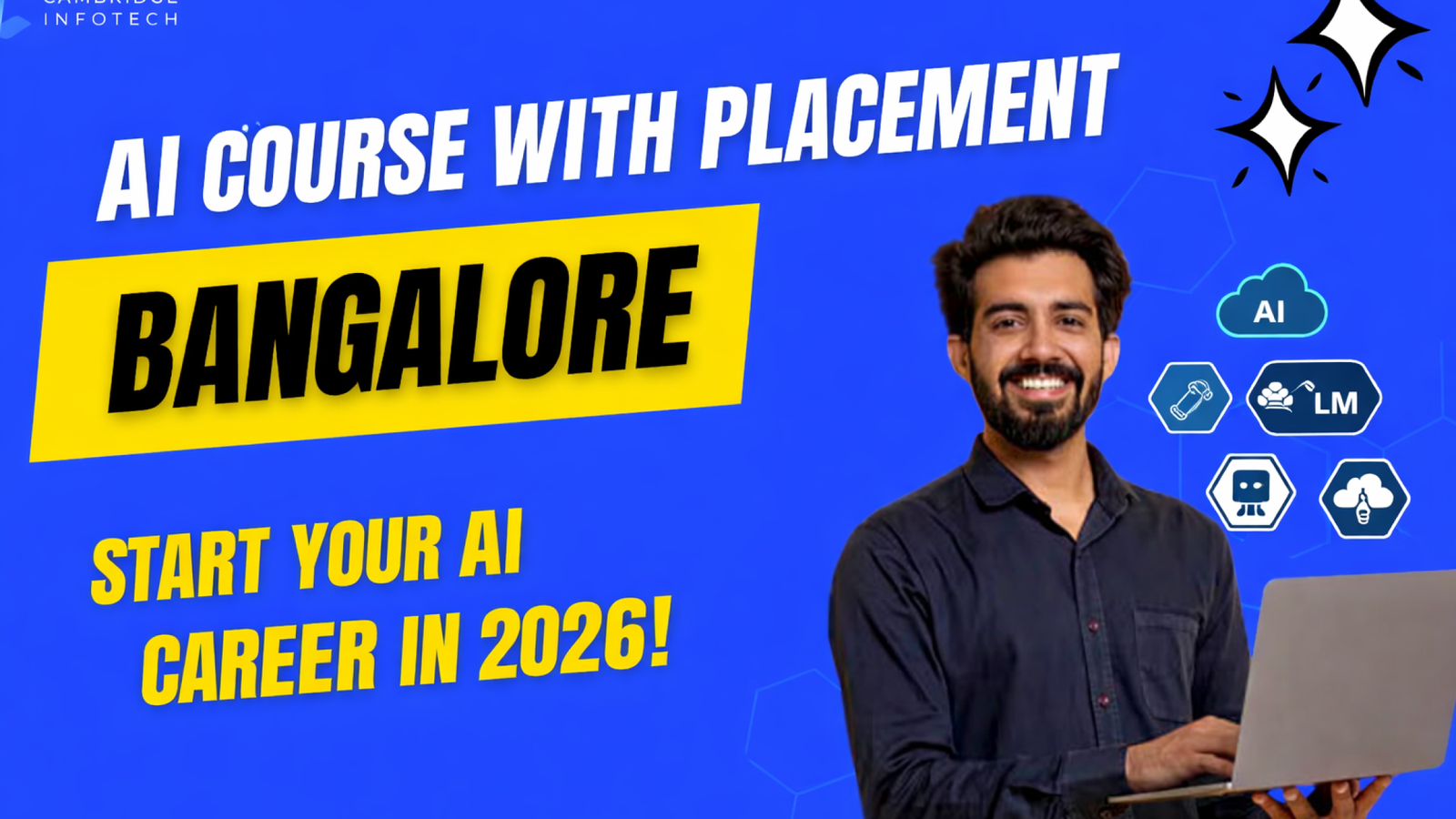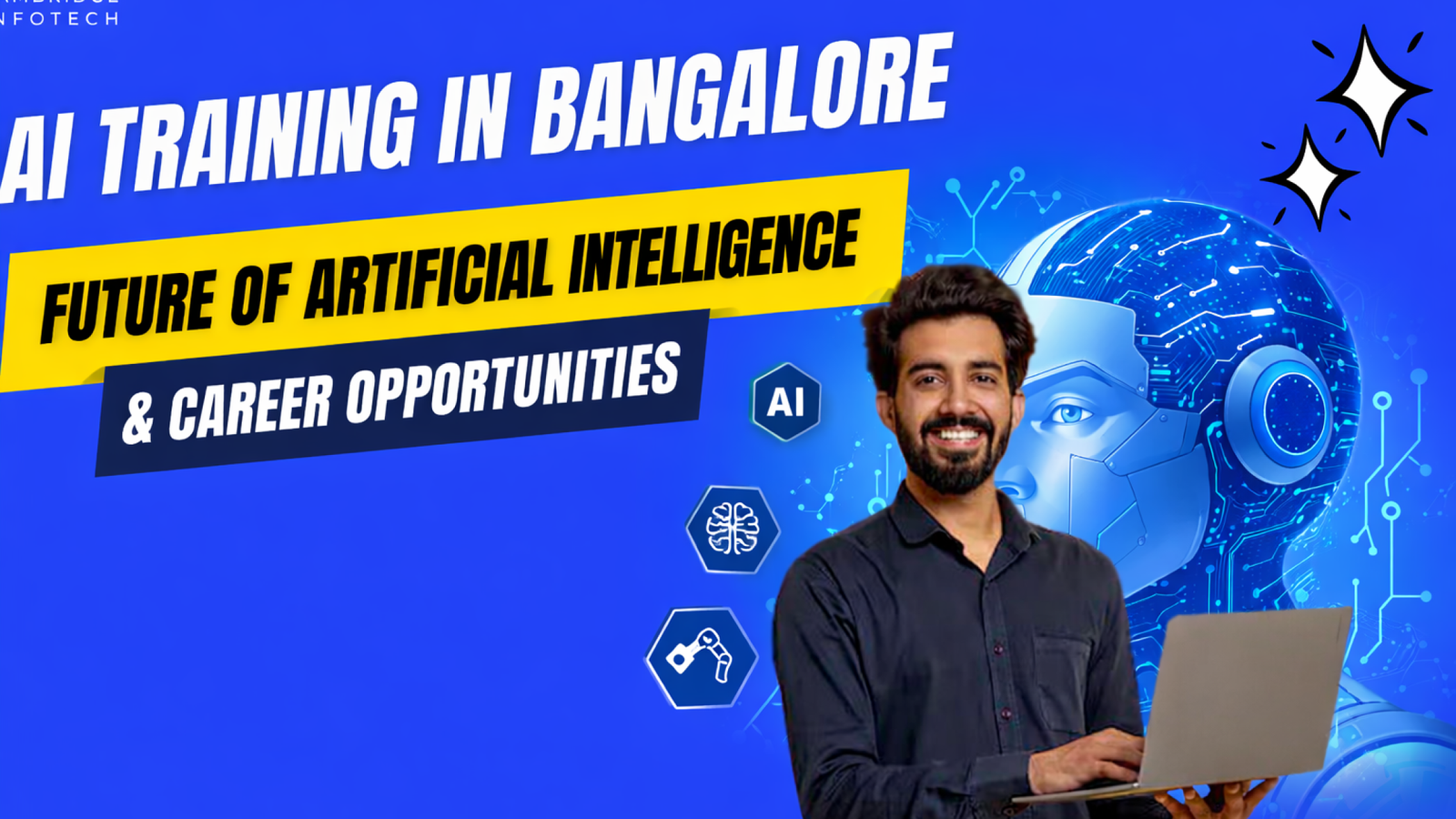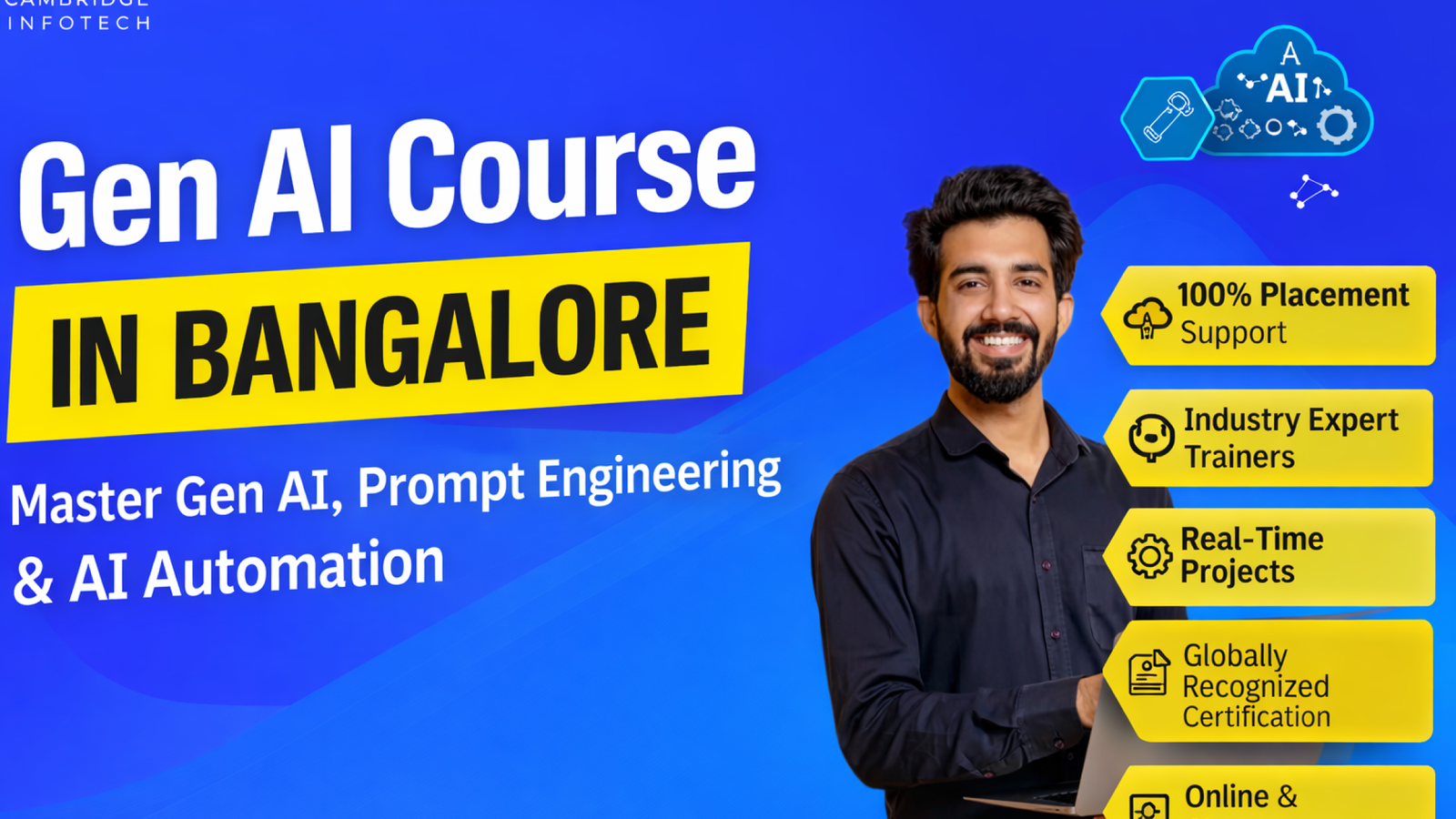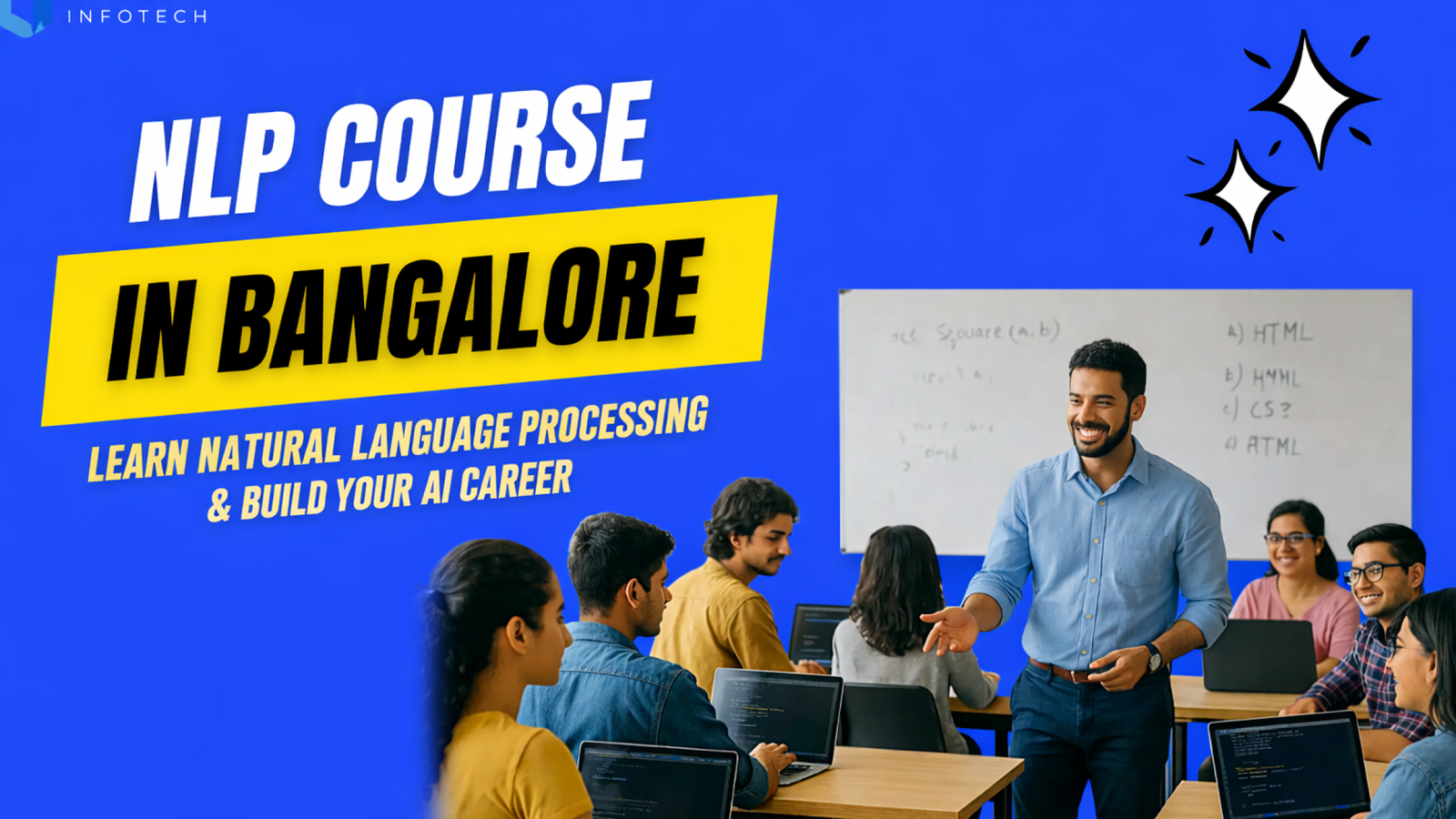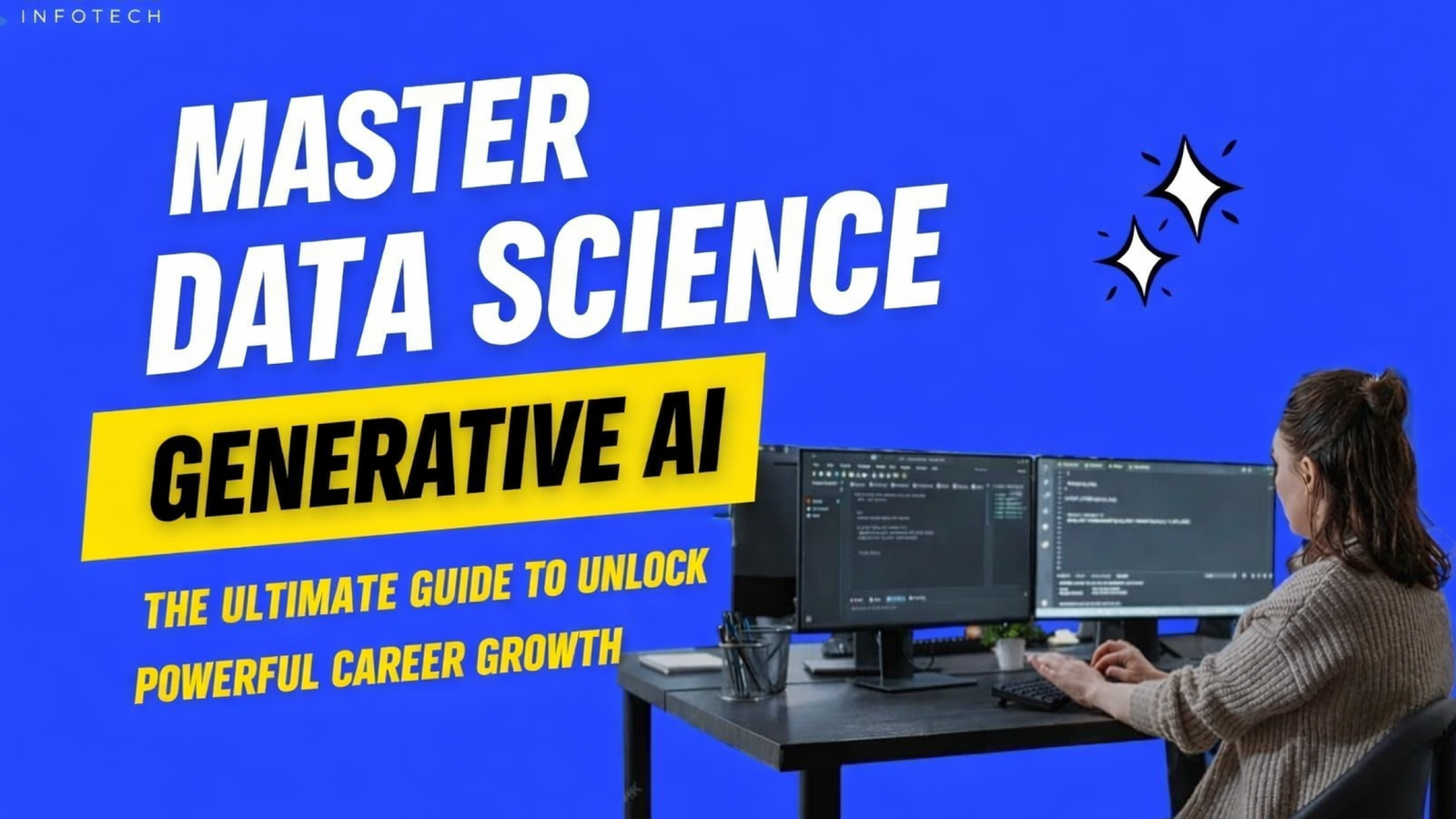Best Reasons to Learn Artificial Intelligence – Boost Your Career & Skills in 2025

Intro
In today’s fast-paced digital world, Artificial Intelligence (AI) is no longer a futuristic concept—it’s a reality that’s transforming industries, careers, and everyday life. From self-driving cars and virtual assistants to healthcare innovations and smart business solutions, AI is reshaping how the world works.
If you’re wondering whether it’s the right time to invest in learning AI, the answer is a resounding yes. The demand for AI professionals is skyrocketing, with organizations worldwide seeking experts who can leverage AI to solve complex problems, automate tasks, and drive innovation.
This comprehensive guide will walk you through the Best reasons to learn Artificial Intelligence, how it can future-proof your career, the skills you’ll gain, and the opportunities waiting for you in this cutting-edge field. Whether you’re a student, a working professional, or someone looking to switch careers, understanding AI today can open doors to limitless possibilities tomorrow.
What is Artificial Intelligence?
Artificial Intelligence (AI) is a revolutionary technology that enables machines to think, learn, and perform tasks that traditionally required human intelligence. From recognizing images and understanding natural language to making decisions and predicting trends, AI is transforming the way we live and work.
Understanding AI is the first step to realizing why it has become one of the most sought-after skills in today’s digital world. Whether it’s self-driving cars, virtual assistants like Siri or Alexa, or AI-powered healthcare solutions, the applications of AI are endless.
This is exactly why so many professionals and students are exploring the Best reasons to learn Artificial Intelligence. Learning AI not only equips you with cutting-edge technical skills but also opens doors to innovative career opportunities, high-paying jobs, and the ability to contribute to the technology shaping our future.
By diving into AI, you are preparing yourself for a future where intelligent machines play a central role in every industry. And that’s just one of the many Best reasons to learn Artificial Intelligence today.
Why AI is the Future of Technology
Artificial Intelligence is no longer just a buzzword—it is the driving force behind the next technological revolution. AI is transforming industries, reshaping business models, and redefining the way humans interact with technology. Its ability to process vast amounts of data, recognize patterns, and make intelligent decisions is unmatched, making it the cornerstone of innovation in the 21st century.
Key Reasons AI is Shaping the Future
Rapid Growth Across Industries:
AI is being integrated into healthcare, finance, retail, transportation, education, and more. For example, AI-powered diagnostic tools help doctors detect diseases earlier, while AI-driven financial algorithms optimize investment strategies.Automation and Efficiency:
AI automates repetitive tasks, allowing humans to focus on creative and strategic work. From manufacturing robots to intelligent chatbots, automation is reducing costs and increasing productivity globally.Data-Driven Decision Making:
Modern businesses rely on AI to analyze massive datasets quickly. AI systems identify trends, predict customer behavior, and provide actionable insights, helping companies make smarter, faster decisions.Personalization and Customer Experience:
AI enables hyper-personalized experiences, such as product recommendations, targeted marketing, and adaptive learning platforms. This creates better engagement, satisfaction, and loyalty.Innovation in Emerging Technologies:
AI powers other cutting-edge technologies like the Internet of Things (IoT), autonomous vehicles, and smart cities. The synergy between AI and these technologies accelerates progress in fields once considered science fiction.Global Demand and Career Opportunities:
As AI adoption increases, the demand for skilled professionals is skyrocketing. Learning AI today ensures a future-ready career with opportunities in research, development, and high-paying roles worldwide.
Top Benefits of Learning AI
Artificial Intelligence (AI) is one of the most transformative technologies of the modern era, and learning AI opens the door to numerous opportunities. Whether you’re a student, professional, or career changer, acquiring AI skills can significantly impact your career growth, earning potential, and overall skillset. Here are the top benefits of learning AI:
1. Future-Proof Your Career
AI is rapidly reshaping the job market. Roles that leverage AI skills—like Machine Learning Engineer, Data Scientist, or AI Researcher—are in high demand globally. By learning AI today, you ensure that your career remains relevant and competitive in the technology-driven world of tomorrow.
2. High-Paying Job Opportunities
AI professionals are among the highest-paid in the tech industry. With businesses investing heavily in AI-driven solutions, mastering AI can significantly boost your salary prospects, both in India and internationally.
3. Work Across Multiple Industries
AI is not limited to a single field. From healthcare, finance, and e-commerce to education, manufacturing, and entertainment, AI skills are applicable across industries. This versatility allows you to explore diverse career paths.
4. Enhance Problem-Solving Skills
AI teaches you how to approach complex problems using data-driven methods. You’ll learn to design intelligent systems that analyze patterns, make predictions, and provide actionable insights—skills highly valued in any profession.
5. Drive Innovation
Learning AI empowers you to create innovative solutions, develop smart applications, and contribute to cutting-edge technologies. Whether it’s building AI-powered chatbots, autonomous systems, or predictive analytics tools, AI knowledge fuels creativity and innovation.
6. Gain Expertise in High-Demand Technologies
By learning AI, you gain expertise in essential technologies such as Machine Learning, Deep Learning, Natural Language Processing (NLP), Computer Vision, and Data Analytics—all crucial for the future of technology.
7. Contribute to Social Good
AI can solve real-world problems, from improving healthcare outcomes to reducing energy consumption and predicting natural disasters. By learning AI, you can use your skills to make a positive impact on society.
8. Networking and Career Growth
AI professionals often collaborate on global projects, attend conferences, and participate in research. Learning AI connects you with a vibrant community of innovators, researchers, and industry experts, accelerating your career growth.
AI Across Industries
Artificial Intelligence is no longer confined to labs or tech companies—it has become a critical tool across industries, transforming the way businesses operate and deliver value. Understanding how AI impacts different sectors helps learners see the real-world applications of their skills and prepares them for a variety of career opportunities.
1. Healthcare
AI is revolutionizing healthcare by improving diagnostics, personalizing treatments, and predicting patient outcomes. Tools like AI-powered imaging, virtual health assistants, and predictive analytics help doctors make faster and more accurate decisions, ultimately saving lives.
2. Finance and Banking
AI is reshaping finance by enabling fraud detection, risk assessment, algorithmic trading, and customer service automation. Banks and fintech companies use AI to provide personalized financial solutions and optimize operations, reducing costs and improving efficiency.
3. E-Commerce and Retail
From product recommendations to inventory management, AI plays a significant role in retail. Personalized shopping experiences, chatbots, and predictive analytics enhance customer engagement and increase sales. AI also helps retailers anticipate demand and optimize supply chains.
4. Education
AI is transforming education through personalized learning platforms, intelligent tutoring systems, and automated grading tools. Students can receive customized learning experiences, while educators can focus on creativity and mentorship rather than administrative tasks.
5. Manufacturing
AI-powered robots, predictive maintenance, and quality control systems are improving efficiency in manufacturing. Companies can reduce downtime, optimize production, and maintain high-quality standards with AI-driven automation.
6. Transportation and Logistics
Self-driving cars, route optimization, and predictive maintenance are AI-driven innovations in transportation. AI enhances safety, reduces delivery times, and improves fuel efficiency for logistics companies worldwide.
7. Marketing and Advertising
AI analyzes customer behavior and preferences to create targeted marketing campaigns. From chatbots to predictive analytics and dynamic pricing, AI helps brands increase engagement and conversion rates.
8. Entertainment and Media
AI powers content recommendations on platforms like Netflix and Spotify, automates video editing, and even generates music or art. It is reshaping the creative process and offering personalized experiences to users.
AI Course Curriculum Overview
A well-structured curriculum is essential for mastering Artificial Intelligence, and our AI course at Cambridge Infotech is designed to provide end-to-end learning—from fundamental concepts to advanced applications. Whether you’re a beginner or a professional, this curriculum ensures you gain the knowledge and hands-on experience needed to excel in AI careers.
1. Introduction to Artificial Intelligence
Basics of AI, history, and evolution
Types of AI: Narrow AI, General AI, and Superintelligent AI
Real-world applications across industries
2. Python Programming for AI
Fundamentals of Python programming
Libraries essential for AI: NumPy, Pandas, Matplotlib
Writing AI algorithms and scripts
3. Machine Learning Fundamentals
Supervised, unsupervised, and reinforcement learning
Regression, classification, clustering algorithms
Model evaluation and performance metrics
4. Deep Learning
Neural networks and architectures
Convolutional Neural Networks (CNN) for image processing
Recurrent Neural Networks (RNN) for sequential data
5. Natural Language Processing (NLP)
Text preprocessing and analysis
Sentiment analysis and chatbots
Language modeling and AI-powered virtual assistants
6. Computer Vision
Image and video processing using AI
Object detection and recognition
Applications in healthcare, security, and autonomous systems
7. AI Tools and Frameworks
TensorFlow, Keras, PyTorch
OpenCV for computer vision
Scikit-learn for machine learning projects
8. AI Project Development
Hands-on projects to apply learned concepts
Real-world problem-solving using AI techniques
Building a portfolio for job readiness
9. AI Ethics and Best Practices
Understanding ethical considerations in AI
Bias, fairness, and transparency in AI systems
Responsible AI development practices
10. Career Guidance & Capstone Project
Guidance for AI job roles and industry expectations
Capstone project to demonstrate practical AI skills
Resume building and interview preparation
Hands-On Learning & Projects
One of the most critical aspects of mastering Artificial Intelligence is practical experience. At Cambridge Infotech, our AI course goes beyond theory, offering hands-on learning and real-world projects that prepare you to tackle challenges in any industry.
Why Hands-On Learning Matters
While understanding AI concepts is important, the ability to apply these concepts to real-world problems sets top professionals apart. Hands-on learning helps you:
Build problem-solving skills: Work with actual datasets to derive insights.
Understand practical applications: See how AI is used in healthcare, finance, e-commerce, and more.
Boost confidence: Gain experience in designing, coding, and deploying AI models.
Create a professional portfolio: Showcase completed projects to potential employers.
Key Projects in Our AI Course
Predictive Analytics Projects
Forecast trends in sales, finance, or customer behavior using machine learning
Natural Language Processing (NLP) Projects
Develop chatbots, sentiment analysis tools, or AI-based translators.
Computer Vision Projects
Implement facial recognition, object detection, and image classification systems.
Recommendation Systems
Build AI algorithms that suggest products, movies, or content based on user behavior.
Capstone Project
A comprehensive project that integrates all learned concepts, tools, and techniques to solve a real-world problem.
Mentorship & Guidance
Every project is guided by industry experts, ensuring you understand best practices, coding standards, and optimization techniques. You also receive feedback and support to refine your models and achieve professional-quality results.
Portfolio for Career Growth
Completing these projects equips you with a strong AI portfolio, which is highly valued by employers. This portfolio not only demonstrates your technical expertise but also your ability to solve real-world challenges using AI.
AI Certifications & Their Value
In the competitive world of Artificial Intelligence, certifications play a vital role in validating your skills and boosting your career prospects. Completing an AI certification demonstrates to employers that you have the knowledge, practical experience, and dedication required to excel in this rapidly evolving field.
Credibility and Recognition
Certifications from reputed institutions like Cambridge Infotech or global AI bodies prove your expertise and commitment. They help you stand out in a crowded job market.
Structured Learning Path
AI certification programs follow a systematic curriculum, covering essential concepts, tools, and technologies. This ensures you gain complete knowledge rather than fragmented learning.
Industry-Relevant Skills
Certifications focus on practical, hands-on skills using real datasets and tools like Python, TensorFlow, PyTorch, and Keras. This makes you job-ready from day one.
Higher Earning Potential
Professionals with AI certifications often command higher salaries compared to non-certified peers, especially in roles like Machine Learning Engineer, Data Scientist, and AI Specialist.
Career Advancement Opportunities
Certified AI professionals are more likely to be considered for promotions, leadership roles, and specialized AI projects within organizations.
Global Recognition
AI certifications are recognized worldwide, enabling you to explore international career opportunities in top companies.
AI Certifications Offered at Cambridge Infotech
AI & Machine Learning Certification – Master core AI algorithms and ML techniques.
Deep Learning Certification – Focus on neural networks, CNNs, and RNNs.
NLP & Computer Vision Certification – Learn advanced AI applications in text and image analysis.
Capstone Project Certification – Showcase your ability to solve real-world AI problems.
Career Opportunities After Learning AI
Artificial Intelligence is one of the fastest-growing fields in technology, and learning AI opens up numerous career paths across industries. Whether you are a student, a professional looking to upskill, or someone considering a career switch, AI offers exciting opportunities with high growth potential.
Top AI Job Roles
AI Engineer
Design, develop, and deploy AI models and systems.
Work on machine learning, deep learning, and neural networks to solve real-world problems.
Machine Learning Engineer
Build algorithms that enable machines to learn from data.
Focus on predictive analytics, recommendation systems, and AI-driven automation.
Data Scientist
Analyze complex datasets and extract actionable insights.
Use AI tools to build models for business intelligence and decision-making.
AI Researcher
Conduct research on advanced AI algorithms, neural networks, and emerging technologies.
Innovate new AI solutions for healthcare, finance, robotics, and more.
Natural Language Processing (NLP) Engineer
Develop AI systems that understand and process human language.
Work on chatbots, virtual assistants, translation tools, and sentiment analysis.
Computer Vision Engineer
Implement AI solutions that interpret and analyze visual data.
Apply skills in industries like autonomous vehicles, surveillance, healthcare, and entertainment.
AI Consultant
Advise organizations on AI strategy and implementation.
Help companies integrate AI into their business processes for maximum efficiency.
AI Product Manager
Manage AI-powered products from concept to deployment.
Ensure AI solutions align with business goals and customer needs.
Industries Hiring AI Professionals
Healthcare: AI-assisted diagnostics, patient monitoring, drug discovery
Finance: Fraud detection, trading algorithms, credit scoring
E-commerce & Retail: Recommendation systems, customer behavior analysis
Education: Adaptive learning platforms, automated grading
Manufacturing & Robotics: Automation, predictive maintenance, quality control
Transportation: Autonomous vehicles, route optimization, traffic management
Global Demand and Growth
The demand for AI professionals is skyrocketing globally. Reports show that AI-related jobs are growing at an unprecedented rate, and certified AI professionals are highly sought after by top tech companies, startups, and multinational organizations.
Salary Trends in AI Careers
Artificial Intelligence (AI) is not just a transformative technology—it’s also a lucrative career path. As industries across the globe adopt AI, the demand for skilled professionals has skyrocketed, leading to competitive salaries and rapid career growth. Here’s an in-depth look at AI salary trends in India as of 2025:
AI Engineer Salary in India (2025)
Entry-Level (0–2 years):
Freshers can expect annual salaries ranging from ₹5 LPA to ₹8 LPA, depending on the company and location.Mid-Level (2–5 years):
Professionals with 2 to 5 years of experience typically earn between ₹8 LPA and ₹20 LPA.Senior-Level (5–10 years):
Senior AI engineers can command salaries from ₹20 LPA to ₹40 LPA, with specialized roles in deep learning or NLP reaching up to ₹50 LPA.Leadership Roles (10+ years):
AI Architects, Project Managers, and Chief AI Officers can earn upwards of ₹50 LPA, with top-tier professionals in multinational companies exceeding ₹1 crore annually.
Salary by Location
Salaries vary across Indian cities:
Bengaluru: ₹14.5 LPA
Mumbai: ₹15.6 LPA
Chennai: ₹10.4 LPA
Salary by Company Type
Startups: ₹5 LPA – ₹10 LPA
SMEs: ₹6 LPA – ₹12 LPA
Large Corporations: ₹10 LPA – ₹20 LPA
Multinationals: ₹12 LPA – ₹25 LPA
Tech Giants (e.g., Google, Microsoft): ₹15 LPA – ₹40 LPA
High-Demand AI Roles & Premium Salaries
Roles specializing in Generative AI and AI Model Operations are in high demand, with professionals in these areas commanding 25–40% higher salaries compared to traditional software engineering roles.
How AI Skills Can Help You Innovate
Artificial Intelligence is more than a career path—it’s a powerful tool for innovation. By mastering AI, you gain the ability to transform ideas into practical solutions, streamline processes, and create products that can impact millions of lives. Here’s how AI skills empower innovation:
1. Automate Complex Tasks
AI enables automation of repetitive and time-consuming tasks, freeing up your time to focus on creative problem-solving. For example, AI can automatically analyze large datasets, detect patterns, or optimize processes, allowing innovators to dedicate energy to higher-level strategy.
2. Enhance Decision-Making
With AI, you can analyze vast amounts of data quickly and make informed decisions. From predicting market trends to optimizing supply chains, AI empowers businesses and individuals to innovate with precision and confidence.
3. Create Intelligent Products and Services
AI skills allow you to develop smart applications such as chatbots, recommendation engines, virtual assistants, and autonomous systems. These AI-powered products not only solve problems but also enhance user experience, driving innovation in industries like healthcare, finance, and e-commerce.
4. Drive Research and Development
AI accelerates research by analyzing complex data sets and simulating scenarios that would take humans much longer to process. This capability fosters innovation in areas like drug discovery, renewable energy, and robotics.
5. Solve Real-World Challenges
By applying AI, you can tackle pressing challenges such as climate change, disease prediction, traffic management, and disaster response. AI enables solutions that are both efficient and scalable, making your innovations more impactful.
6. Encourage Creative Problem-Solving
AI does not replace human creativity—it enhances it. By providing data-driven insights and predictive models, AI allows innovators to test ideas, explore alternatives, and experiment with new approaches confidently.
7. Stay Ahead in a Competitive Market
Organizations that leverage AI are more likely to outperform competitors by offering smarter products, efficient services, and innovative solutions. Mastering AI ensures you remain a thought leader and innovator in your field.
Common Myths About Learning AI
Despite its growing popularity, many people hesitate to learn Artificial Intelligence due to misconceptions and myths. Understanding the truth behind these myths can help you start your AI journey with confidence.
1: AI is Only for Programmers or Engineers
Many believe that only people with a computer science background can learn AI. Reality: AI courses are designed for beginners, professionals, and students from diverse fields. With dedication and guidance, anyone can learn AI concepts and apply them effectively.
2: AI is Too Complex to Learn
AI may seem intimidating because it involves math, algorithms, and programming. Reality: Modern AI courses, like the one at Cambridge Infotech, break concepts into simple, understandable modules with hands-on projects to make learning manageable and practical.
3: AI Will Replace Human Jobs
Some fear that AI will take over all jobs. Reality: While AI automates repetitive tasks, it creates new career opportunities that require human creativity, strategy, and decision-making. Learning AI positions you for the jobs of the future.
4: You Need Expensive Resources to Learn AI
Many assume AI learning requires costly tools or supercomputers. Reality: Most AI tools and platforms are freely available or affordable, and online courses provide all necessary resources, including datasets and coding environments.
5: AI is Only About Robots
People often associate AI exclusively with robotics. Reality: AI spans multiple domains, including natural language processing, computer vision, recommendation systems, healthcare analytics, and finance. Robotics is just one application.
6: AI Skills Become Obsolete Quickly
Some worry that AI is evolving so fast that learned skills may become outdated. Reality: Core AI concepts, programming skills, and problem-solving techniques remain relevant and foundational, while continuous learning keeps you updated with the latest technologies.
7: AI is Only for Big Companies
It’s a common belief that AI is useful only for large organizations. Reality: Startups, small businesses, and entrepreneurs can leverage AI for automation, customer insights, and innovation, making it accessible to all.
AI Learning Resources & Tools
Learning Artificial Intelligence effectively requires the right resources, tools, and platforms. At Cambridge Infotech, our AI course ensures learners have access to everything needed to master AI concepts and gain practical skills.
1. Programming Languages
Python: The most popular language for AI due to its simplicity and vast libraries.
R: Widely used for statistical analysis and machine learning.
Java & C++: Useful for large-scale AI systems and performance-critical applications.
2. AI Libraries and Frameworks
TensorFlow: An open-source platform for building and training machine learning models.
Keras: High-level neural network API for easy prototyping of deep learning models.
PyTorch: Flexible and widely used in research and industry for deep learning projects.
Scikit-learn: Ideal for beginners to implement standard machine learning algorithms.
OpenCV: Essential for computer vision tasks like image and video processing.
3. Data Resources
Kaggle: A platform offering datasets, competitions, and notebooks for practical learning.
UCI Machine Learning Repository: Access to hundreds of datasets for experimentation.
Google Dataset Search: Quickly find datasets across multiple domains.
4. AI Development Platforms
Google Colab: Free cloud-based platform to write and execute Python code with GPU support.
Jupyter Notebooks: Interactive coding environment for AI projects.
Microsoft Azure & AWS AI Services: Cloud platforms offering AI tools, training, and deployment capabilities.
5. Online Learning Resources
Video tutorials, webinars, and AI blogs for continuous learning.
Documentation and community forums for libraries like TensorFlow, PyTorch, and Keras.
MOOCs (Massive Open Online Courses) to supplement classroom training.
6. Tools for Collaboration & Version Control
Git & GitHub: Manage code versions and collaborate on AI projects.
Slack / Teams: Communicate and share ideas within AI project groups.
7. AI Communities & Forums
Participate in AI forums and communities like Stack Overflow, Reddit AI groups, and Kaggle discussions to stay updated, get support, and network with professionals worldwide.
Why Choose Cambridge Infotech for AI Learning
Choosing the right institute is crucial when building a successful career in Artificial Intelligence. Cambridge Infotech stands out as a premier AI training provider, offering comprehensive, hands-on, and industry-relevant programs that ensure you gain the skills, confidence, and experience needed to excel in the AI field.
1. Industry-Driven Curriculum
Our AI course is carefully designed by industry experts to cover everything from basic concepts to advanced AI applications. The curriculum includes Machine Learning, Deep Learning, Natural Language Processing, Computer Vision, and practical projects, ensuring learners are ready for real-world challenges.
2. Hands-On Learning Approach
We emphasize learning by doing. Our students work on real datasets, AI tools, and projects that replicate industry scenarios. This practical experience is vital for understanding concepts deeply and building a strong AI portfolio.
3. Experienced Mentors & Trainers
At Cambridge Infotech, you learn from AI professionals with years of industry experience. They provide guidance, mentorship, and insights into best practices, ensuring every student receives personal attention and expert support.
4. Industry-Recognized Certifications
Our AI certifications are recognized by top companies, giving learners a competitive advantage in the job market. Completing the course demonstrates both knowledge and practical proficiency, boosting your credibility.
5. Career Support & Placement Assistance
We don’t just teach AI—we prepare you for a career. Our placement assistance includes resume building, interview preparation, and job referrals, helping you secure roles as AI engineers, data scientists, and machine learning specialists.
6. Flexible Learning Options
We offer online and classroom training, accommodating working professionals, students, and international learners. Our programs are designed to fit into your schedule without compromising learning quality.
7. Real-World Projects & Portfolio Building
Cambridge Infotech ensures every learner completes hands-on projects, creating a portfolio that demonstrates practical expertise to potential employers. Projects cover AI applications across industries like healthcare, finance, e-commerce, and more.
8. Supportive Learning Environment
Our learning ecosystem encourages collaboration, discussion, and problem-solving, helping students grow their knowledge and confidence while staying motivated throughout their AI journey.
FAQs About Learning AI
Learning Artificial Intelligence can be exciting, but it also raises several questions. Here are the most frequently asked questions by learners, answered to help you make an informed decision:
1. Who can learn AI?
AI can be learned by anyone with basic computer knowledge and a passion for technology. Whether you are a student, working professional, or career switcher, structured AI courses make it accessible to all backgrounds.
2. Do I need prior programming knowledge to learn AI?
While programming knowledge is helpful, it is not mandatory. Our AI course starts with Python fundamentals, gradually introducing learners to AI algorithms, machine learning, and deep learning concepts.
3. How long does it take to learn AI?
The duration depends on your learning pace and course type. Cambridge Infotech’s comprehensive AI program typically takes 3–6 months for beginners to gain proficiency and hands-on experience.
4. What job roles can I get after learning AI?
After completing an AI course, you can pursue roles such as AI Engineer, Data Scientist, Machine Learning Engineer, NLP Specialist, Computer Vision Engineer, AI Consultant, and more.
5. Do AI professionals earn good salaries?
Yes! AI professionals are among the highest-paid in technology. Entry-level salaries in India start around ₹5–8 LPA, while experienced professionals can earn ₹20–50 LPA or more, with top roles reaching ₹1 crore annually.
6. Is AI only for tech companies?
No. AI is applicable across healthcare, finance, retail, education, manufacturing, transportation, and more. Organizations of all sizes leverage AI to improve efficiency and innovation.
7. Will AI replace human jobs?
AI automates repetitive tasks but creates new opportunities that require creativity, decision-making, and problem-solving skills. Learning AI positions you for future-ready careers.
8. Are AI certifications valuable?
Absolutely. AI certifications validate your skills, enhance employability, and demonstrate practical expertise, making you stand out to employers globally.
9. Can I learn AI online?
Yes. Online courses provide flexibility, interactive content, and hands-on projects. Cambridge Infotech offers both online and classroom training to suit your schedule.
10. How can I start my AI journey?
The first step is enrolling in a structured AI course like the one at Cambridge Infotech, which covers theory, hands-on projects, certifications, and career guidance to help you succeed in the AI field.
Take the First Step Towards Your AI Career – Enroll Now!
Call us at: 099024 61116
Visit our Website: cambridgeinfotech.io/




